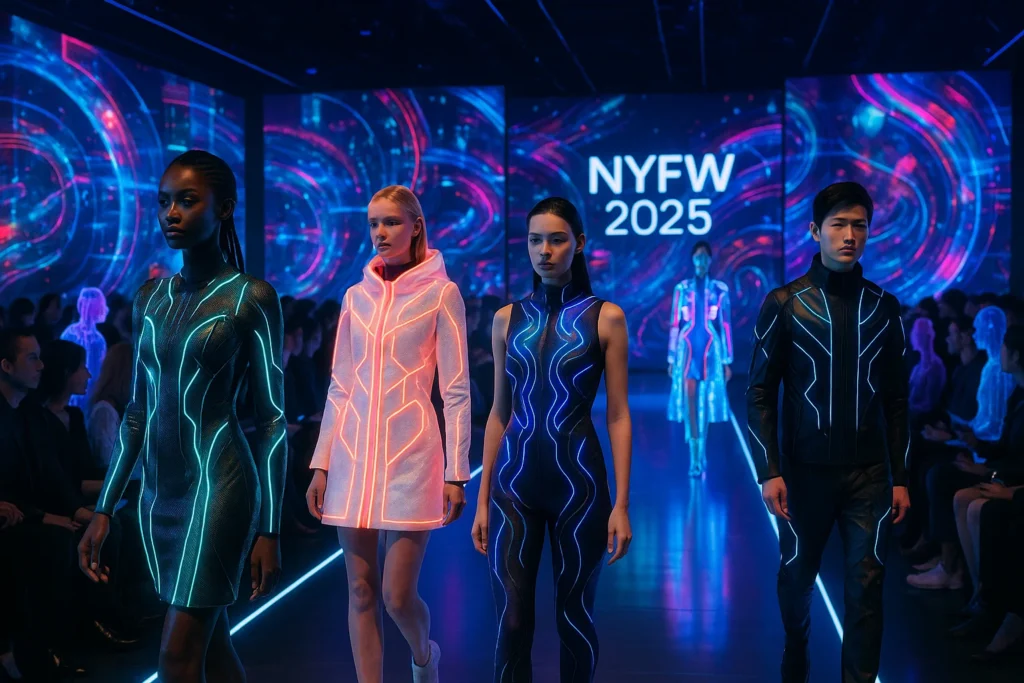Discover how AI-powered designs, virtual models, and smart textiles transformed New York Fashion Week 2025 into the boldest tech-meets-fashion event yet.
Introduction: When Fashion Walks Hand in Hand with AI
New York Fashion Week (NYFW) has always been more than a runway event—it’s the pulse of the global fashion industry. But in 2025, the week-long spectacle became something bigger: a fusion of couture and cutting-edge technology. Artificial Intelligence, once reserved for Silicon Valley startups and Wall Street algorithms, strutted boldly into the spotlight of Manhattan.
This year’s NYFW wasn’t just about fabrics, models, or silhouettes. It was about algorithms as designers, data as stylists, and AI-driven experiences reshaping how we define style. From AI-created collections to virtual supermodels with millions of Instagram followers, the runway showcased how tech is no longer just behind the scenes—it’s center stage.
For USA-based audiences, where tech innovation and cultural trends collide daily, NYFW 2025 felt like a moment where two worlds—the glamour of fashion and the intelligence of machines—merged to create something truly unforgettable.
The Dawn of AI-Designed Couture
Algorithms as Designers
For the first time in NYFW history, several major fashion houses, including Tommy Hilfiger, Ralph Lauren, and Carolina Herrera, collaborated with AI platforms to co-create entire collections. These weren’t just AI suggestions for fabric choices—the machines were designing, iterating, and finalizing looks.
AI systems analyzed decades of style archives, streetwear data from TikTok trends, and consumer purchase behavior from platforms like Amazon and Macy’s. The result? Collections that felt deeply familiar yet refreshingly new—clothing that reflected what people are wearing now while forecasting what they’ll crave next season.
Case Study – The Ralph Lauren AI Collaboration
Ralph Lauren unveiled its “Timeless Future” line, co-created with an AI model trained on the brand’s archives since 1967. The collection combined classic polo shirts with futuristic fabrics that adjusted to body temperature—think of it as “Hamptons prep meets Silicon Valley innovation.”
Smart Fabrics Hit the Runway
Fashion has always been about looking good, but in 2025, it’s also about functioning smartly.
Tech-Infused Textiles
This year, designers showcased fabrics that do more than drape elegantly:
- Self-cleaning jackets powered by nanotechnology.
- Mood-reactive dresses that change color depending on the wearer’s heart rate.
- Temperature-regulating coats perfect for unpredictable U.S. winters from New York to Chicago.
The standout? A collaboration between Nike and AI-driven textile startup FibeTech, which introduced sneakers that adapt their cushioning based on the wearer’s gait in real time.
Health Meets High Fashion
Many U.S. audiences are already wearing fitness trackers and smartwatches, so it felt natural when clothing began tracking wellness too. Several collections featured AI-embedded fabrics that monitored hydration, posture, and even stress levels. Imagine a silk blouse that tells you to relax during a stressful Wall Street meeting or a hoodie that alerts you when you’re dehydrated—this was the kind of innovation audiences saw on the runway.
Virtual Models Take Center Stage
Goodbye Exclusivity, Hello Inclusivity
For decades, fashion week runways have been criticized for lack of diversity. In 2025, AI helped fix that. Virtual models powered by hyper-realistic AI rendering allowed designers to showcase collections on digital avatars representing different body types, ethnicities, and ages.
Audiences cheered when an AI-generated model in a wheelchair confidently rolled down the runway in a shimmering gown. These moments weren’t gimmicks—they signaled a cultural shift in how the industry represents beauty.
Virtual Influencers as Front-Row Guests
It wasn’t just models—AI influencers sat in the front row, too. Digital personalities like Lil Miquela and new AI fashion influencer “Aria Hudson” live-streamed collections to millions of TikTok and Instagram followers. For U.S. Gen Z audiences, who spend hours engaging with virtual creators, this wasn’t strange—it was normal.
AI-Driven Personalization
Fashion for the Individual, Not the Masses
Imagine watching a runway show online and instantly getting AI-curated outfit recommendations tailored to your body type, style preferences, and budget. That’s exactly what happened this NYFW.
Brands integrated AI shopping assistants into livestreams. As viewers across the U.S.—from Los Angeles to Miami—watched the shows, they received personalized style recommendations with links to buy pieces in real-time.
Case Study – Macy’s AI Shopping Tool
Macy’s partnered with an AI platform that allowed online viewers to “try on” NYFW outfits virtually using augmented reality. With just a smartphone camera, users could see how that glittering gown or leather jacket looked on them before clicking buy.
This shift could redefine e-commerce. Instead of browsing endless pages of clothing, shoppers now let AI suggest the exact item they’ll likely purchase—and love.
The Business of AI in Fashion
Redefining Speed-to-Market
Traditionally, it takes months from concept to runway to retail. With AI’s predictive design tools, brands cut that timeline down drastically. Some designers previewed looks on the runway that were already available online and in select stores.
For U.S. consumers, who expect same-day shipping and instant gratification thanks to Amazon, this shift is monumental. Fashion is no longer seasonal—it’s immediate.
Sustainability Through AI
Sustainability has been a growing conversation in the U.S., especially among millennials and Gen Z. AI is helping fashion become greener by:
- Predicting demand and reducing overproduction.
- Optimizing fabric cutting to reduce waste.
- Identifying eco-friendly alternatives to harmful dyes and textiles.
For example, Stella McCartney’s AI-assisted line focused on biodegradable fabrics while minimizing carbon footprint—an approach resonating strongly with eco-conscious U.S. buyers.
The Cultural Impact of AI Fashion
A U.S. Identity Shift
Fashion in America has always reflected cultural identity—from the denim revolution to hip-hop’s influence on streetwear. Now, AI is reshaping that narrative.
NYFW 2025 showed how AI-driven fashion reflects not just style but society. It bridges Silicon Valley innovation with New York glamour, creating a uniquely American story of tech-meets-art.
Concerns and Criticism
Not everyone is cheering. Some argue that AI-designed fashion risks losing the human touch that makes couture meaningful. Others worry about job displacement for designers, stylists, and even models.
But most agree that NYFW 2025 proved AI is not replacing creativity—it’s enhancing it. As designer Prabal Gurung said in an interview:
“AI isn’t stealing artistry; it’s like a new fabric. It’s up to us how we use it.”
Looking Ahead – What AI Means for Fashion’s Future
AI at NYFW 2025 wasn’t a one-off—it was a blueprint for the future. Here’s what to expect in the next few years:
- Fully AI-run fashion brands that operate without human designers.
- Smart wardrobes that auto-suggest daily outfits.
- Digital-only clothing lines that exist purely in the metaverse.
- AI styling apps that act like personal fashion consultants in your pocket.
For U.S. consumers, this future feels both exciting and slightly surreal. But if NYFW proved anything, it’s that once fashion and tech meet, there’s no going back.
Conclusion: The Moment AI Became Fashion
New York Fashion Week 2025 will be remembered as the year AI officially took its place on the runway. From AI-designed couture to smart textiles, from virtual models to personalized shopping, the event showed us that fashion is no longer just about fabric and design—it’s about data, intelligence, and cultural transformation.
For U.S. audiences, the message was clear: the future of style isn’t just about what’s trending on Fifth Avenue, but also what’s trending in Silicon Valley. The marriage of fashion and AI has only just begun, and NYFW 2025 will be remembered as the wedding ceremony.
In a world where individuality and innovation drive consumer behavior, AI has proven that it doesn’t strip fashion of its soul—it helps it evolve. The runway lights may have dimmed, but the impact of AI fashion is only getting brighter.

